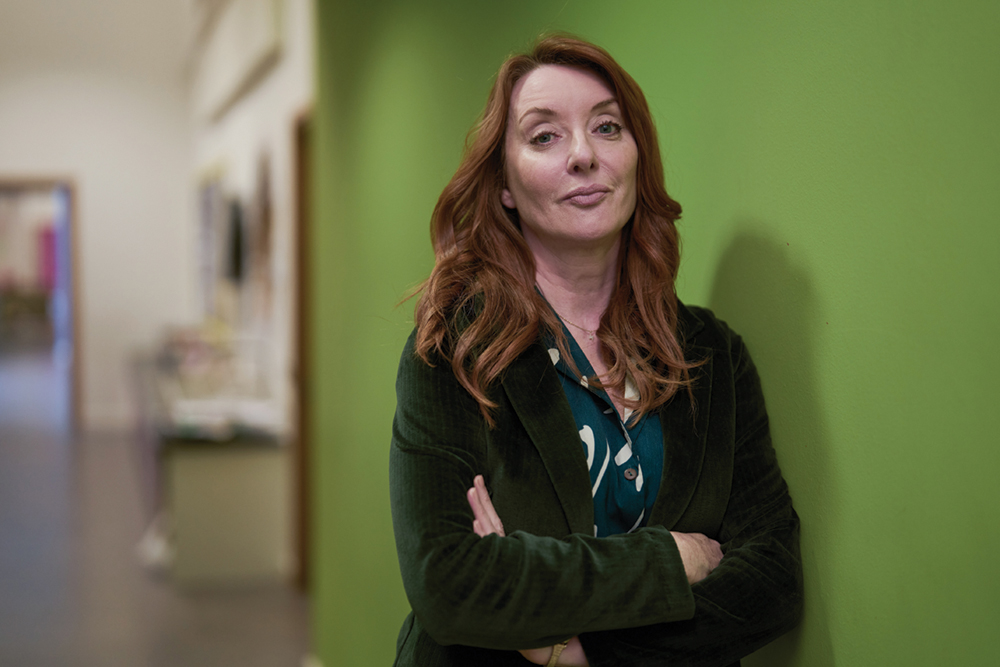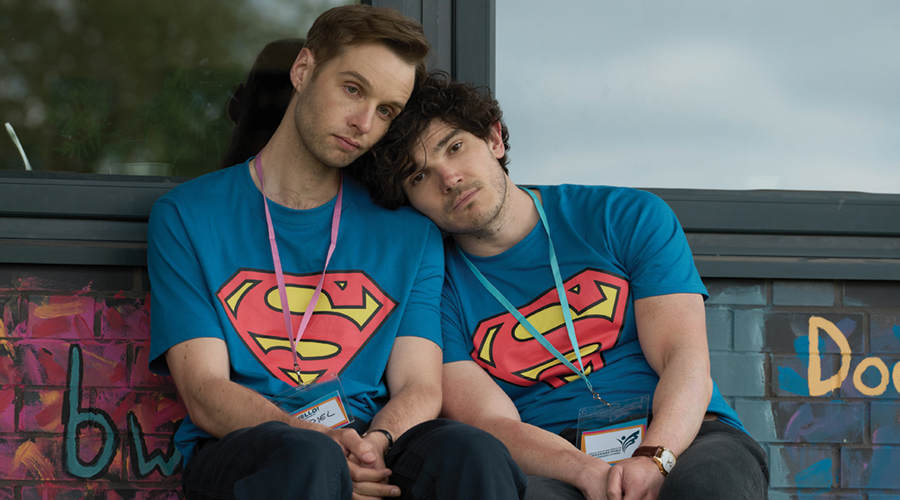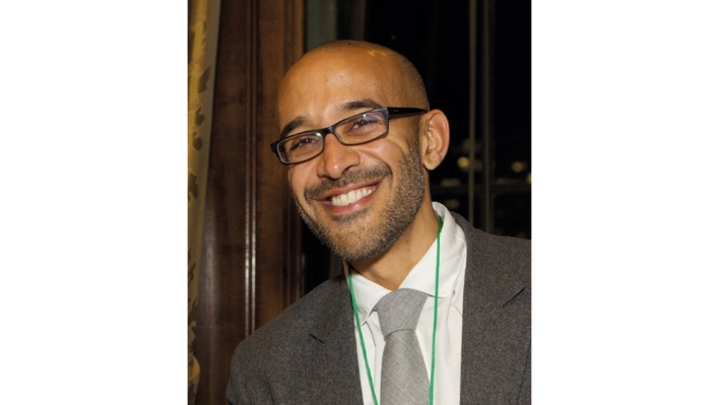For series creator Daf James, Lost Boys & Fairies is a “coming-of-middle-age story”.
Set in Cardiff, the bilingual English and Welsh drama follows Gabriel and Andy, played by Sion Daniel Young (known from Deceit) and Fra Fee (Hawkeye), on their journey to adopt their first child.
Gabriel is an artist and “performer-extraordinaire” at a queer cabaret club called Neverland. Like Peter Pan, he has never really grown up. Andy, an accountant, is a picture of stability and middle-aged domesticity.
At once hilarious and heartbreaking, Lost Boys & Fairies draws on James and his husband’s own adoption experience. They have adopted three children, two boys and a girl. It is a show about families – the ones you are born with and the ones you choose. “It’s rooted in the personal for me, psychologically and emotionally,” says James. “I’m a fairy and a lost boy simultaneously.”
Tired of seeing social workers portrayed as antagonists on screen, in Lost Boys James writes Jackie, played by Elizabeth Berrington (The Pact), as the hero of Gabriel and Andy’s story. She’s the humorous heart of the show, lightening emotionally fraught moments with a disarming quip or cheeky comment. As she says: “I’m a social worker, boys, not a priest.”
Lost Boys & Fairies began as part of BBC’s TV Drama Writers’ Programme, now known as Pilot, in 2019. The initiative paired James with Leeds-based production company Duck Soup Films; the series marks James’s first original screenplay for the BBC and Duck Soup’s first commission.
For Duck Soup founders Bekki Wray-Rogers, Libby Durdy and Jessica Brown Meek, it was the perfect first independent project. They had previously worked together on This Is England ’86 and Utopia, and this drama ticked all their boxes of championing an authentic new voice while conveying a powerful message.
The journey from script to screen was long and arduous. The pilot came close to a green light at the end of 2019, garnering praise from BBC TV’s then Head of Drama, Piers Wenger, and BBC One Controller Charlotte Moore. But Covid derailed the project.
Lost Boys & Fairies was eventually commissioned in 2021, with the stipulation that it would not start shooting until 2023. For a new indie, the conditions could not have been tougher, but the extended gestation period allowed James and the Duck Soup team to expand the pilot into a three-part mini-series.
“It meant we were really well prepared,” Brown Meek says. “The scripts were in fantastic shape before we even started prep, which is obviously the ideal.”
James arrives as an exciting new voice in TV, and there are similarities with his fellow countryman Russell T Davies. Both masterfully balance dark and light subject matter with whip-smart humour. James says: “If you can make your audience laugh, you can disarm them and take them on these journeys and, hopefully, plummet into emotional depths with them as well.”
Though the show is full of emotional truth, James insists that Lost Boys & Fairies is not a “true story” per se. Characters such as Gabriel’s difficult father, Emrys, his partner, Andy, or the young boy the couple hope to adopt, Jake, are all “works of fiction”.
“Daf writes with an emotional journey at the forefront of his mind,” says Young, who plays Gabriel. “He is so bang-on with all of those emotional beats.”

Bursting with songs and colourful costumes, the series is a visual delight, with James also acting as music director. But this is no saccharine high-school musical. Flashbacks to Gabriel’s early years show his troubled upbringing at the hands of a strict religious father, while the Thatcher Government’s Section 28 – which prohibited the promotion of homosexuality – sets the political agenda and the family watch terrifying adverts on TV warning of Aids.
Gabriel’s repressed sexuality manifests in dangerous ways. His early adult years are a mess of seedy toilets, drug-fuelled benders and sex parties filled with strangers.
Songs act as soliloquies, revealing Gabriel’s troubled inner world. Personal demons are excavated through epic moments of fantasy. At numerous points, Gabriel is visited by the devil.
James uses magical realism as a powerful entry point to explore the psychological depths of his characters. “Naturalism, to me, isn’t very realistic,” he says. “We’re all complex beings, aren’t we? And magical realism allows us to put that on screen.”
He honed his storytelling voice in the world of theatre. His first play, Llwyth, can be seen as an embryonic version of Lost Boys & Fairies. Starring a fresh-faced Young while he was still at drama school, the play was directed by Arwel Gruffydd, who plays Berwyn, aka the drag queen Fanny Ample, in Lost Boys & Fairies.
Following a group of gay friends out on the town in Cardiff, the bilingual drama explored what James saw as the conflict between his Welsh and queer identities. Llwyth was the first Welsh-language play about gay characters to be written by a queer playwright. James describes it as a personal and political triumph. “It was one of the highlights of my life. When the audience stood up, and then my parents were on their feet, I felt like my identity was being validated by my community as well as my family.”
With a Welsh and English drama on prime-time BBC One, James has his sights set on a new frontier. Growing up with Welsh as his first language, he rarely saw himself represented on mainstream TV, and had to endure terrible attempts at Welsh accents. “The message that gives to a child growing up is that your identity doesn’t matter.”
While S4C has been showcasing Welsh-language talent for more than 40 years, it’s still rare to find a bilingual Welsh and English drama on linear TV, something James finds “terrible” and long overdue. “It’s a living language on this island!” he says, exasperatedly.
“I’m not purely doing it from a political perspective – I’m just putting [Welsh] in the drama because that’s my life, so I want to reflect it,” he says. “If, as a byproduct of that, we can give better representation to all these minority identities, that’s a fantastic thing.”
Young, who was born and raised in Cardiff and went to the same Welsh-language school as James, felt empowered by the bilingual dialogue, which was “totally natural” and authentic. “It feels special to have this platform on a BBC One show, where people are going to be watching scenes in the Welsh language in the same way as so many have been doing with Spanish or Korean TV over the past few years,” he says.
As for Duck Soup, with Lost Boys & Fairies as its debut series, it has confidently set out its stall. “Hopefully, [Lost Boys & Fairies] should leave you somewhere slightly different to where you started, where you see the world with a bit more scope and compassion,” Wray-Rogers says. “It’s the perfect calling card: this is who we are.”
Lost Boys & Fairies is on BBC One and iPlayer from 3 June.







